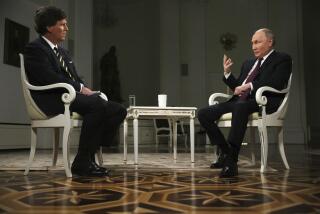Reporter’s Notebook : Gorbachev Meets Press, Puts Things in ‘Ordnung’
MOSCOW — An amused Mikhail S. Gorbachev suddenly halted his news conference Wednesday to put some order into it.
The Soviet leader noticed that some of the foreign journalists did not understand anything he was saying. He quickly realized what had happened. A large number of Soviet officials, anxious to witness the first open news conference by Gorbachev in the Soviet Union, had taken up many of the seats equipped for simultaneous translation.
Gorbachev took charge of the problem. “Let the Soviets who don’t have to listen take that row there,” he said. “Come on, change over. I can see people here who are not connected with the press. Why don’t they give up their seats to those who can’t hear the translation?”
When he spotted a hesitant official, Gorbachev pointed at him and demanded, “Why are you sitting there? Come on, get up and change places.”
When he felt satisfied that all the foreign journalists could now understand him, Gorbachev smiled and announced: “As our German friends say, ordnung (order).”
Gorbachev’s wife, Raisa, also decided to help the press out a bit, but she may have caused a problem for it.
At a special exhibit of medieval Russian icons at the Tretyakov Gallery in Moscow, Mrs. Gorbachev presented a catalogue to Nancy Reagan, then turned to the press and handed a second catalogue to Donnie Radcliffe of the Washington Post. Mrs. Gorbachev described it as a gift from herself to the press covering the summit.
“You give it to the one you believe has covered the summit the best,” she said. “It is up to you to decide among yourselves who will get the book.”
Late into Wednesday night, it was still not clear who would win the catalogue or how he or she would be chosen.
A number of unhappy Soviet citizens have found a ray of hope for themselves in Reagan’s visit.
U.S. Embassy officials say they have been deluged in recent days by calls from people asking the President to help them. Some want him to help them find jobs or housing. Others ask him to correct injustices and ease the way for them to emigrate.
Some have traveled hundreds of miles to try to bring their plea to the embassy, only to find it surrounded by Soviet policemen and plainclothes security agents.
On Wednesday, a block from the embassy, two such women, shabbily dressed and middle-aged, asked a reporter to deliver their appeals to U.S. officials.
One of the women, from Baku near the Iranian border, said she was unable to find work and accused the KGB of persecuting her family for 20 years. “Dear Mr. President,” she wrote, “are there organizations that can help when human rights are violated? If so, whose are they, and where?”
What actually goes on in the meetings between Reagan and Gorbachev? Lt. Gen. Colin L. Powell, the national security adviser, has offered some insight into the tenor of the sessions.
“Frankly,” Powell told an interviewer for the Cable News Network, “in the meetings that I’ve attended there have been no fireworks. There have been good, candid discussions back and forth. Every now and then, a little bit of emotion creeps into the conversation, but no fireworks--no shouting, no screaming, no pounding.”
On a somewhat different note, Gorbachev and Reagan were asked by reporters Wednesday if their sessions had produced any surprises.
Reagan simply repeated the question, “Any surprises?” But Gorbachev replied, “The President and I are in favor of greater predictability in our relationship.”
Industrialist Armand Hammer announced he will help foot the bill for building the Soviet Union’s first golf course, an 18-hole affair on the outskirts of Moscow.
But it may take some time for Soviet duffers to get the hang of the game, which is unknown in the Soviet Union. An interperter assisting in announcing Hammer’s support for the course had to explain to his Soviet listeners that golf “is played with a little ball.”
Times staff writer Robert Gillette contributed to this article.
More to Read
Sign up for Essential California
The most important California stories and recommendations in your inbox every morning.
You may occasionally receive promotional content from the Los Angeles Times.










